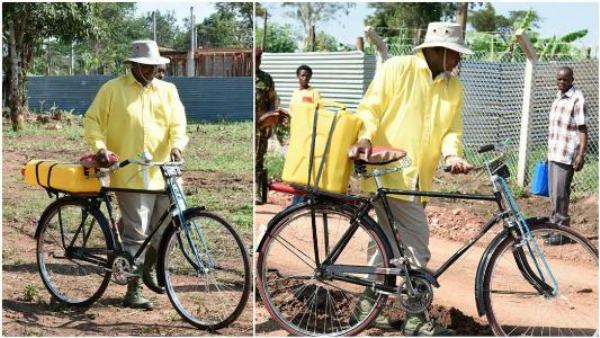Mr Norbert Mao, who leads one faction of the Democratic Party, wrote in last Sunday’s Monitor an opinion attacking President Museveni for his initiative of demonstrating how drip irrigation works. Titled “Museveni as President cum water carrier of Luweero”, the column sought to portray the President’s action as populist and cheap political drama “choreographed and rehearsed by the President’s image makers”. He also attacks the President’s lack of humility, citing his convoy and “palatial residences”.
First, I must commend Mao for religiously following President Museveni on Twitter. A lot of his references were based on material he picked from the President’s twitter account. Unsurprisingly, Mao could not give the full picture of the conversation, choosing to highlight a few negative comments. If he cared to look harder, Mao would have seen comments, including from Kenya’s former Chief Justice Willy Mutunga commending President Museveni.
Just to share a little more online statistics, besides the tweet which had 222 likes and 149 retweets (by Monday 7th, November), President Museveni’s Facebook post with the same message had been viewed 377,767 times, had 4,000 likes and had been shared 1,800 times. A look across the social media platforms of most Ugandan politicians will tell you this is very high traffic and overwhelming endorsement of the President’s message. Contrast that with Mao’s own Facebook post of October 26 about Crane Bank closure; it has only four comments and has been shared six times!
Mao writes that the President was being populist—which is very far from the point. President Museveni has been consistently advising farmers on the need to irrigate their crops considering the changing weather patterns and long dry spell. He is also concerned that natural resources like swamps that contribute to about 40 percent of our rainfall generation are being invaded. In his address to the new cabinet on June 23, 2016 at Entebbe State House, the President spoke at length about agriculture.
Specifically on irrigation, he said the government had repaired and boosted Doho, Mubuku, Olweny and Agoro irrigation schemes. He added that with expected revenue increases, mega irrigation schemes would be initiated in the Mount Elgon and Mount Rwenzori regions plus the South Western highlands and Agoro Hills.
The President added: “As far as lowlands are concerned, I have already told Makerere University to develop a solar powered water pump to push water, at the local level, to any raised ground where it can then flow by gravity to the farm.” And even as we wait for Makerere University to complete their innovation, the President has gone ahead to support model farmers with such solar-powered irrigation pumps.
One such farmer is Mr Charles Kwehangana Rutaaro of Kyerero Village, Nyamihanda Parish in Rubanda County, Kabale District. With the President’s support, Mr Rutaaro received solar-powered irrigation equipment for his two-acre farm on which he grows assorted fruits—earning Shs43 million annually. Buoyed by his success, President Museveni last weekend directed the agriculture ministry to set up similar projects in other parts of Kabale, Kiryandongo, Masindi, Kaberamaido, Soroti, Katakwi, Kumi, Mukono and Luuka districts.
With all these initiatives on irrigation, does the President’s practical demonstration of drip irrigation still come off as populist and mere propaganda ahead of the 2021 election? To the contrary I think it is Mr Mao who is suffering from politico-mania. It is he who is obsessed with politics and elections. President Museveni has just won an election resoundingly. His singular most concern is how to improve Ugandans’ lives; reason he is ready to go the extra mile to demonstrate what he thinks are simple but practical interventions that can help the ordinary farmer.
The President actually tweeted: “With changing weather patterns and unreliable rainfall, farmers must do more irrigation. Like I demonstrated, it should not be expensive.” He added: “I want to show that where mechanized means are absent, one can still do manual irrigation. It is about being innovative.”
Reading Mao’s piece, there was another disturbing observation. Across the 800 words or so, a leader of a faction of one of Uganda’s oldest political parties, actually makes no single proposition on how drought and its effects can be mitigated even when it is the subject of debate. All he’s carried away with is attacking President Museveni’s convoy (as if he doesn’t know the security threats alive in the region given Uganda’s leading role in fighting terrorism) and the architectural designs of State House (again failing to distinguish between what is public property and the President’s private homes).
It should therefore not surprise any keen watcher that Mao and his group are yet to convince Ugandans that they can take charge of this country’s affairs—not with this kind of misplaced priorities.
The writer is the Senior Press Secretary to His Excellency the President
Twitter: @nyamadon











